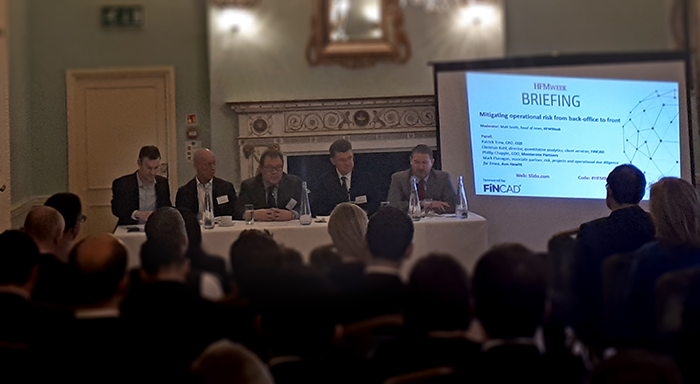
Last week saw FINCAD host a breakfast briefing with HFM Week. Over 70 people attended the event, titled, “Mitigating operational risk from back-office to front.” Attendees heard from several industry experts, including FINCAD’s Christian Kahl, PhD, Director of Quantitative Analytics. Speakers discussed key best practices that leading hedge funds are using to overcome their biggest challenges related to operational risk.
The Problems
Many hedge funds are facing increased scrutiny by investors to improve operational risk management. It’s important to highlight that it is not investment returns alone driving investors to invest; deep dive due diligence, which looks at the organisation as a whole, plays a big part too. The loss of confidence in the operational processes of the fund can have a negative impact on the reputation of a fund and this can be hard to recover from. One of the panellists went as far to say that operational risk was most likely to cause ‘catastrophic hedge fund failure’ and ‘from an investor’s point of view it shouldn’t go wrong.’
This focus on operational issues drove the conversation and it was clearly an area where managers risk not only losing returns, but also investors, if it is not handled properly.
Is technology the answer?
The panel agreed that an important way to mitigate risk is to improve technology. However, it is crucial to ensure that firms select the right technology for their needs, as one size clearly ‘does not fit all’ when it comes to risk systems.
Many funds purchase technology without really understanding what is going on under the hood, which only serves to increase risk. If you don’t understand your processes and where your figures are coming from, the risk of error rises exponentially. Most of the panel showed preference to purchasing software instead of building large in house IT teams believing this in itself can increase operational risk. But panellists also warned that using third-party vendors can be dangerous as well if you do not understand their technology.
It is most important to fit the infrastructure and solution to the organisation. This is particularly true in the hedge fund sector, as they build their intellectual property on top of software solutions. Thus, hedge funds will benefit most from a risk solution that is flexible, scalable and easily customizable.
The Trade Off
A trade-off between flexibility and operational risk is often a problem when hedge funds seek out new risk technology. On one end of the scale, there are large black box solutions with high degrees of automation, which may not fit your business’ optimal work flow. On the opposite end, there are home-grown solutions that use lots of Excel and Python snippets, but don’t interact with one another. Therefore, what is required is a customised solution based on robust technology.
During the briefing, a panellist commented that Python is a great tool, but now companies are seeing many isolated Python solutions, as they previously had with Excel. This need for flexibility will need to be reconciled into the general infrastructure. The power that comes with these tools is significantly higher than what was there before.
The panel were in unanimous agreement that hedge funds require scalable and adaptable solutions that enable the company to grow.
Conclusions and Takeaways
A key outcome of the event was that technology can help reduce operational risk, but only if implemented correctly. Software isn’t only about fitting lots of pieces together, but a company needs to understand which parts are most fundamental and what goals they are aiming for in the long run. A client can then build a system that best suits them, investing in the key parts first and subsequently building and adapting this solution as the company grows. That is, they can add the bells and whistles once the foundations are secure.
Updating systems is a difficult, expensive and time-consuming process. Thus, it is important to take a step back, envision your ideal solution and work backwards. It’s a lot more difficult to change a system than to put in a new one.
In our discussions, several people questioned if some aspects were going well with their current risk systems, did that mean that everything should be replaced? Or, would it be easier to just replace parts? The panel were in agreement that companies must make sure all different systems connect with each other and not to invest in technology just for the sake of it.
When buying technology, keeping good relationships with the software vendor is key. Hedge funds want a partner in a provider and don’t want to be too invested in one individual. Nor do they want to be sold a product and given no support in how to implement, manage and develop it.
Likewise, using a single individual consultant or developer can lead to problems down the line. There is danger that this key person may leave, or fall out of favour with the company. We at FINCAD have seen several clients experience this issue. They were left with a system they were unable to amend or develop further. This situation can be very costly for a firm, especially when areas of their risk systems become broken.
So where does FINCAD come in?
At FINCAD, first and foremost, we look to become a trusted partner of our clients. We work together, helping clients tailor a solution that fits their exact requirements. Our scalable technology offering helps to make this possible, with our object oriented analytics engine at its heart.
The bespoke, customised solutions we build for our clients can be easily plugged into their current infrastructure. We also work to build out their architecture in a scalable way, affording them room to grow business efficiently. Flexibility is at the core of our offering, but with a robust technology stack that fully integrates—not to mention an experienced professional services team available to help build and maintain the system over the long term.
Learn more about how FINCAD helps hedge funds reduce operational risk.

